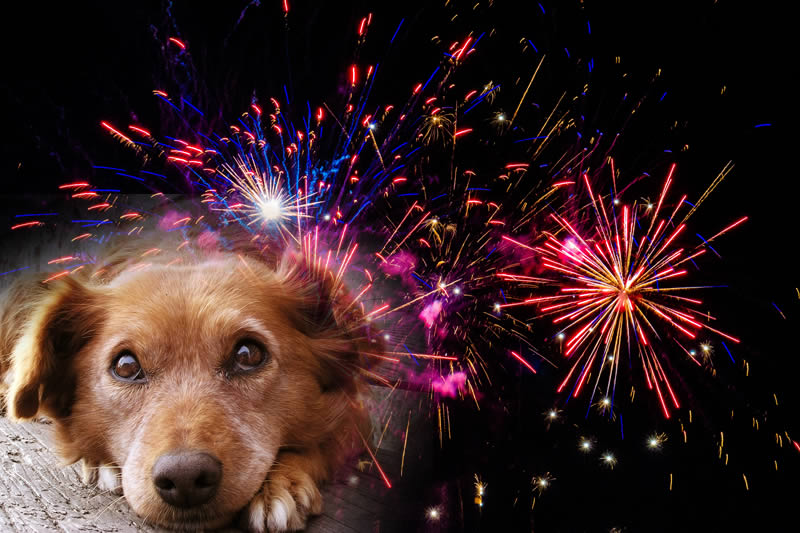While firework displays look beautiful and exciting to humans, most animals – both domestic and wild – can feel like they’re in a war zone. It’s not only the noise, although that is frightening enough to animals with acutely sensitive hearing, like cats. Measuring between 150 and 175 decibels, fireworks are louder than many planes at takeoff (about 140 decibels)!
Add to this the showers of coloured sparks visible in the night air, and the smell of smoke in the air, and it’s easy to see why animals may be frightened by fireworks. They sense danger in the sound, sight and smell of exploding rockets and firecrackers. And since animals – even domestic pets – have heightened survival skills, they will try to escape the danger by running away or hiding.
But it’s impossible to escape the noise on Guy Fawkes night, Diwali and New Year’s Eve. It comes from all directions. And it’s completely unpredictable, occuring without warning at different intervals, so pets can’t get used to it. While some dogs and cats seem unfazed by fireworks, others experience full-blown panic.
This is true of wild animals and birds as well, with consequences we may never see. The sudden bursts of light and noise can disrupt nesting birds, causing them to abandon eggs or hatchlings. Nocturnal animals, like owls and bats, rely on the cover of darkness to hunt and navigate. Fireworks can disorient them, leading to accidents and even death.
Chemicals in spent fireworks that fall into streams and dams can contaminate the water, affecting aquatic life, as well as animals that drink from these sources.
How do we stop it?
Every year animal welfare groups like the SPCA campaign passionately against the use of fireworks with loud bangs. As a result, some fireworks – Indian Kings, Square and Cherry bombs – are now illegal in South Africa. There are also increased regulations around the sale of fireworks.
Children under the age of 16 are not allowed to buy fireworks. And where minors are using fireworks, they must do so under the supervision of an adult. In addition, South African legislation forbids the use of fireworks in public spaces, and they may not be detonated within 200 metres of a hospital, clinic, petrol station, nursing home, old age home or animal welfare organisation. They can only be used in designated areas away from people and animals.
Nevertheless, despite the threat of hefty fines or even imprisonment, these laws are routinely ignored. So if you have pets that are disturbed by the bangs and crackles, you need to take matters into your own hands.
Signs your pet is afraid of fireworks
Dogs may bark incessantly, whine, pant, tremble or try to hide. Fear may also cause them to urinate or defecate in the house. Cats may seek refuge in hidden corners. Both cats and dogs may attempt to run away from the perceived danger, which can result in horrific injuries.
For example, pets that try to escape through windows may be cut by broken glass; dogs attempting to leap over garden walls may be impaled on spikes or razor wire. Others may dash out into the road and be run over by passing cars.
Even if they are not badly hurt, animals that run away from fireworks may lose their bearings and be unable to find their way home. Every year, the Durban & Coast SPCA takes in hundreds of lost pets during fireworks season.
Keep your pets safe when fireworks are let off
As responsible pet owners, we must recognise the signs of distress and provide comfort to our beloved animals.
Try not to leave pets alone on the evenings when fireworks are more likely to be used extensively. If you cannot stay home, make sure pets are contained in a safe place from which they are unable to escape or hurt themselves.
Ideally, keep your pet indoors and with someone. Close windows and draw curtains to minimise sound. Play background music or leave the television on to provide ambient noise to mask the sound of fireworks.
Be sure to ignore the fireworks yourself. Pets are sensitive to your mood and if you jump every time a firecracker goes off, your pet will assume that there is indeed something to be afraid of.
Create a safe space for your pet to hide. Many dogs and cats like to hide under your bed or in a similar small, enclosed area. Put down a padded bed, heavy blanket or stack of pillows to help deaden the noise. If necessary, consult your veterinarian for advice on calming medication or behavioral strategies.
Make responsible choices
Advocate for responsible choices in your community. Awareness can go a long way in reducing the risks animals face during these festive displays. By considering the well-being of all animals, including wild birds and creatures, we can create a world where our celebrations coexist harmoniously with nature.


I’m a pet lover I totally hate that pets have to be put through this trauma .. celebrating a festive should have been lights not loud bangs👎many dogs go missing at this time even alot loose their life’s so uncalled😔
We have people in our area that sell fireworks to kids that are under 16 years and at any time were there is special times to set of fireworks which they don’t have proper storage and permit for fireworks I for one don’t stand for this nonsense please take some action